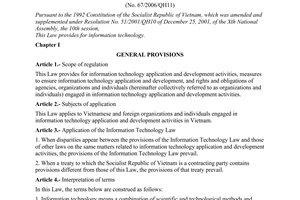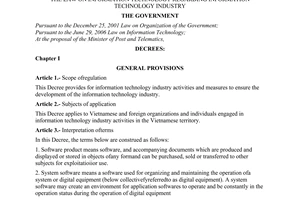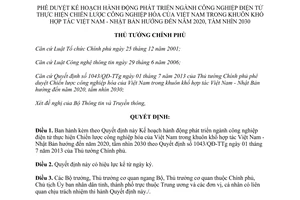Nội dung toàn văn Decision No. 1290/QD-TTg 2014 plan of action for development of electronics industry in implementation
|
THE PRIME
MINISTER |
THE SOCIALIST
REPUBLIC OF VIETNAM |
|
No. 1290/QD-TTg |
Hanoi, August 01, 2014 |
DECISION
APPROVING THE PLAN OF ACTION FOR DEVELOPMENT OF ELECTRONICS INDUSTRY IN IMPLEMENTATION OF VIETNAM’S INDUSTRIALIZATION STRATEGY WITHIN THE FRAMEWORK OF VIETNAM-JAPAN COOPERATION THROUGH 2020, WITH A VISION TOWARD 2030
THE PRIME MINISTER
Pursuant to the December 25, 2001 Law on Organization of the Government;
Pursuant to the June 29, 2006 Law on Information Technology;
Pursuant to the Prime Minister s Decision No. 1043/QD-TTg of July 1, 2013, approving Vietnam s industrialization strategy within the framework of Vietnam-Japan cooperation through 2020, with a vision toward 2030;
At the proposal of the Ministry of Information and Communications,
DECIDES:
Article 1. To promulgate together with this Decision the Plan of Action for development of electronics industry in implementation of Vietnam’s industrialization strategy within the framework of Vietnam-Japan cooperation through 2020, with a vision toward 2030, under the Prime Minister’s Decision No. 1043/QD-TTg of July 1,2013.
Article 2. This Decision takes effect on the date of its signing.
Article 3. Ministers, heads of ministerial-level agencies, heads of government-attached agencies, chairpersons of provincial-level People’s Committees and related units and individuals shall implement this Decision.
|
|
PRIME MINISTER |
PLAN OF ACTION
FOR
DEVELOPMENT OF ELECTRONICS INDUSTRY IN IMPLEMENTATION OF VIETNAM’S
INDUSTRIALIZATION STRATEGY WITHIN THE FRAMEWORK OF VIETNAM-JAPAN COOPERATION
THROUGH 2020, WITH A VISION TOWARD 2030
(Promulgated together with the Prime Minister’s Decision No. 1290/QD-TTg of
August 1, 2014)
I. SITUATION
1. Position, role, formation and development of electronics industry in Vietnam
a/ Scope of electronics industry in Vietnam
Under the Government’s Decree No. 71/2007/ND-CP of May 3, 2007, detailing and guiding the implementation of a number of articles of the Law on Information Technology on information technology industry, hardware and electronics industry covers designing and manufacture of hardware products; assembly and processing of hardware products; and provision of hardware industry services. Hardware products include computers, network equipment and peripheral devices; audio-visual electronics; household electronic appliances; special-use electronic products; communication - telecommunications, multimedia equipment; electronic parts and spare parts; and other hardware products.
b/ Position and role of electronics industry
Electronics industry is a fundamental material production sector of the national economy, holding a key position in a modern economy and exerting a strong impact on other industries. The development of electronics industry helps step up the process of industrialization and promote the development of other industries and service sectors, thereby attracting labor and creating jobs. On the one hand, electronics industry is a sector bringing about great profits and a national source of capital accumulation; on the other hand, it makes it possible to modernize other industries and change the way of thinking as well as the working style of the entire society. This is why electronics industry is also regarded as the basic technology of a modern society which can strongly change production technologies and economic structure and modernize economic, cultural and social relations.
c/ Development of Vietnam’s electronics industry
Vietnam’s electronics industry in the 2000-2010 period recorded an average annual growth rate of 20-30%. In 2011, its growth rate reached over 96%. Many giant foreign information technology groups investing in Vietnam, including Intel, Samsung Electronics, Canon, Nokia, etc., are expanding their operation. In 2012 alone, the industry exported products worth over USD 22.9 billion, accounting for 18% of the export turnover of the whole country and, for the first time, electronic products became the commodity line with the largest export value (exceeding the crude oil export value). Main export electronic products include hardware parts, products and equipment, computers, electronic and telecommunications products.
Though being regarded as a spearhead industry and having recorded numerous achievements in foreign direct investment (FDI) attraction and played a key role in export, in reality Vietnam’s electronic industry is till at the initial stage of the electronic production chain. Though the turnover of the hardware and electronics industry accounts for around 90% of the whole information technology industry, in reality this value is largely held by FDI enterprises while domestic enterprises only focus on assembly and provision of commercial services.
d/ SWOT analysis of Vietnam’s electronics industry
- Strengths:
Vietnam has a favorable geographical position in a region with rapidly and dynamically developing industries, especially electronics industry.
Vietnam enjoys a very stable security and politics and always guarantees safety for investors.
Vietnam’s advantage is a young population, of whom 60% are in the working age (17-60 years) and 94% are literate. Vietnam’s abundant workforce is considered fast-learning in the operation, use and assembly of electronic equipment, including modern ones.
Relatively cheap labor: Relatively low labor costs in Vietnam give enterprises that manufacture support products and assemble electronic appliances a competitive edge over regional countries. Overheads and labor costs in Vietnam are much lower than those in India, China and the Philippines.
Vietnam has important mineral resources necessary for the development of the electronic material industry, such as iron, rare earth, titanium, ruthenium, barite and ilmenite.
With a population of over 90 million, Vietnam is a potential consumption market. The Vietnamese Government always encourages and supports foreign companies to invest in and cooperate with Vietnamese enterprises in electronics industry.
- Weaknesses:
Not yet able to supply sufficient materials on its own and having to import materials, Vietnam is dependent on these supply sources.
The industry’s manufacture capacity remains limited and for a long time Vietnam has lacked important sections for the development of electronics industry, such as plants manufacturing printed circuit boards (PCB) and assembling of parts on PCBs; chipset designing; plants manufacturing chipsets; logic design on the basis of programmable logic devices; design and manufacture of electronic products. Enterprises have mainly assembled pre-designed products from imported parts, creating a low added value of between 5-10%.
The competitiveness of products also remains low: Product types are poor, product quality is low and product prices are high due to the fact that material and part costs in Vietnam are higher than those in regional countries and there is no strong electronic product brand.
- Opportunities:
The exportability of Vietnamese information technology products and electronic parts is on the rise: Vietnam’s accession to WTO has created favorable conditions for propelling these products into the regional and world markets.
Attracted foreign direct investment capital has considerably increased, contributing to promoting the economic development and Vietnam has become an ideal investment destination for giant electronics corporations around the world.
Prices of electronic and telecommunications products will be sharply reduced once the tariff barrier is removed, creating a driving force for the development of electronics industry.
Greater attention and investment from leading countries in electronics industry, including the United States, Japan and the Republic of Korea, will make Vietnam more attractive for other investors.
- Threats:
The competitive pressure right in the home market is increasing due to the poor competitiveness of Vietnamese enterprises which have small capital, poor business administration experience, and low technologies, management personnel quality and labor productivity.
Talent attraction: Vietnamese enterprises’ demand for grey matter and high-quality human resources is exerting greater pressure on Vietnam’s university system.
The status and size of enterprises are required to satisfy customers with higher and higher requirements on quality, time, prices and scale.
Lack of qualified human resources to meet requirements of the technological leadership: To meet the trend that electronic products are integrated with smart software and services and energy-efficient is a great challenge for manufacturing enterprises in electronics industry.
Abolition of protection policies, especially tax policies: Domestic manufacturing enterprises will face the challenge of price competition with imports once import duty on equipment in complete sets is reduced to be equal to or lower than that on imported parts.
Japan, as a leading country in the world in electronic industry, and Vietnam, with the advantages of abundant human resources and a large market, can cooperate with each other in order to bring about benefits for both in general and their electronics industry in particular.
II. ORIENTATIONS THROUGH;2020 AND A VISION TOWARD 2030
1. Implementation viewpoint
To promote the development of Vietnam’s electronics industry on the basis of tapping its potential and comparative edge and effectively using resources to improve the industry’s competitiveness, contributing to stepping up the national industrialization and modernization.
To create a breakthrough in investment attraction and raise the effectiveness of foreign direct investment in general and Japanese investment in particular in Vietnam’s electronics industry; to establish and strengthen the manufacturing linkage between Japanese and Vietnamese enterprises; to promote transfer of technologies and management models, research and development, human resource training and market development.
To attach importance to the development of supporting industries, combine the manufacture of key electronic components, spare parts and products with the development of embedded software, control software and special-use software applications to serve as a foundation for the industry’s sustainable development.
To synchronously and thoroughly implement support solutions, including: realizing commitments to prioritizing the promotion of development of electronics industry; tax incentives and credit assistance for electronics industry and related support industries; training and developing an abundant, skilled and quality workforce: building brands, developing markets and facilitate the distribution and circulation of made-in-Vietnam products.
2. General objectives by 2020
To develop Vietnam’s electronics industry with modern technologies, high productivity and competitiveness on the regional and world markets, making great contributions to the national economy and effectively serving the national industrialization and modernization. To manufacture electronic products with high added value and a technological spillover effect up to modern quality standards for export and domestic consumption.
3. A vision toward 2030
To build Vietnam into a country with large-scale production of electronic equipment with new, smart and environment-friendly technologies.
III. OBJECTIVES BY 2020
- To attract many quality investment projects from-foreign countries, especially Japan, in electronics industry and related support industries.
- To mobilize to the utmost the participation of the Vietnamese and foreign governments, enterprises and scientists, especially those from Japan, in the entire process of planning, development and evaluation of development effectiveness of Vietnam’s electronics industry.
- To build research and development capacity, master technology, embedded software and control software in order to create, design and produce Vietnamese hardware and electronic products.
- By 2020, the production value of electronics industry will increase at least 20% and contribute at least 10% to the total industrial production value, ranking 10th among sectors with the highest productivity growth rate.
- By 2030, Vietnam will become a country with large-scale production of electronic equipment with new, smart and environment-friendly technologies, ensuring the rationales of its economic conditions, and maintain high growth rate and productivity and sustainable development.
IV. STRATEGIC ISSUES
- Development of support industries for electronics industry.
- Development of human resources for electronics industry.
- Development and expansion of the domestic and export markets for electronics industry.
- Attraction of investment from leading electronics corporations around the world.
- Development of key products of electronics industry.
- Formation of electronics industry clusters.
V. PLAN OF ACTION
1. Specific tasks
a/ To develop support industries for electronics industry
To actively implement the Prime Minister’s Decision No. 12/2011/QD-TTg of February 24, 2011, on policies to develop a number of support industries; to review and supplement preferential policies to encourage and attract investment in production of support industry products prioritized for development in electronics industry. To propose addition of support industry products which need to be prioritized for development in the coming time to suit domestic and international economic developments.
To revise, supplement and complete standards and technical regulations applicable to the production of support industry products in electronics industry. On that basis, to, elaborate regulations on application of such standards and technical regulations to the production in order to improve quality and prestige of support industry products in Vietnam’s electronics industry.
To formulate programs on alignment and establish information channels between enterprises of Japan and other countries and Vietnamese support industry enterprises in order to help promote investment and transfer of technologies and management models, research and development of support industry products in electronics industry.
b/ To develop human resources for electronics industry
To improve the quality of graduate and postgraduate human resources for electronics industry. To substantially renovate training methods and curricula of electronics- telecommunications and information technology faculties of technical universities and colleges. To closely associate with prestigious training organizations and establishments of Japan and other countries in training high-quality human resources for electronics industry.
To formulate programs to attract senior experts and provide supports to Vietnamese abroaders when they graduate and return home and graduate engineers for their business startup in electronics industry.
To encourage the application of the tripartite (enterprise-institute, school-state management agency) training model for training highly skilled human resources to meet requirements of enterprises.
To specifically evaluate the demand for labor and training capacity of training and job-training institutions in electronics industry, and use evaluation results as a ground for formulation of a program to support workers to obtain international professional skills certificates.
c/ To develop and expand the domestic and export markets for electronics industry
- The domestic market:
To intensify the survey and evaluation of the demand of state agencies, enterprises and the society for products of electronics industry.
To create a mechanism to encourage organizations and state agencies to use home-made electronic products.
- The export market:
To formulate a program to promote the image of Vietnamese electronic products as safe and high-quality products in foreign markets.
To intensify international cooperation, trade promotion and marketing activities which are independent or within the framework of the national trade promotion program. To support enterprises in establishing their branches and representative offices or commercial centers in foreign countries to survey market needs and tastes, advertise products, promote brands, enter into contracts and organize sale of products.
d/ To attract investment of leading electronics corporations around the world
To reform administrative procedures in the field of investment to attract leading electronics corporations around the world and their satellite enterprises to invest in Vietnam.
To elaborate regulations to permit export processing enterprises to sell on the domestic market electronic parts and accessories which cannot be produced in Vietnam in order to develop support enterprises and increase the localization rate of assembling enterprises.
To support the attraction and implementation of large FDI projects in electronics industry.
dd/ To develop key products of electronics industry
To formulate and promulgate mechanisms and policies to support the production of electronic products prioritized for development specified in the Prime Minister’s Decision No. 49/2010/QD-TTg of July 19, 2010.
To introduce policies to promote technology transfer and step up the application of high technologies in electronics industry based on the linkage between the State, enterprises and training institutions in the form of public-private partnership.
e/ To form electronics industry clusters
To form electronics industry clusters to facilitate the capital accumulation and investment of enterprises in order to create linkages among and raise operation effectiveness of electronics enterprises.
To provide investment supports for infrastructure construction: To supply stable power sources and convenient information network and transport infrastructure.
2. Solutions
a/ Funds for the implementation of the Plan of Action shall be mobilized from the central budget, local budgets, international aid, social and community contributions and other lawful sources;
b/ Prioritizing the provision of state budget allocations for implementation of the Plan of Action, especially infrastructure construction, human resource training, research and development, and trade promotion for electronics industry. Central budget shall be allocated for the performance of tasks and projects within the plans assigned to ministries and central agencies, direction and management of the plan implementation and provision of supports for a number of important schemes and projects under local management. Local budgets shall be allocated for the performance of tasks and projects within plans under local management. Organizations and enterprises shall, within the ambit of their powers, allocate funds for the performance of tasks set forth in the Plan of Action;
Annually, based on the objectives and contents of the Plan of Action, ministries, sectors, localities, organizations and enterprises shall elaborate detailed plans to perform tasks and implement schemes and projects and make funding estimates, then submit them to competent authorities for approval and implement them in accordance with law. Funds and funding sources for performance of tasks and implementation of schemes and projects are detailed in the enclosed Appendix.
c/ Prioritizing the use of ODA loans on-lent by the Government for schemes and tasks of development of electronics industry;
d/ Encouraging all economic sectors to invest in electronics industry, paying special attention to attraction of foreign investment from giant corporations, transnational groups and enterprises invested by Japan and other foreign countries currently conducting in production and business activities in Vietnam;
dd/ Prioritizing the provision of investment credit for small- and medium-sized enterprises (SMEs) for production, research and development, and training of human resources for electronics industry through the Fund for Development of SMEs, the National Fund for Science and Technology Development, the National Fund for Technology Renewal and other funds in accordance with law.
3. Specific plan of action
|
No. |
Scheme and task |
Assigned organization of implementation |
Implementation period |
|
|
Implementing agency |
Coordinating agency |
|||
|
1 |
Development of support industries for electronics industry |
|||
|
1.1 |
[Supports, tax incentives] Elaboration of specific criteria and simple and convenient procedures for determination of projects eligible for incentives and provision of incentives to enterprises manufacturing support industry products for use in electronics industry under Decision No. 12/QD-TTg of February 24, 2011 on development of support industries |
Ministry of Industry and Trade |
Ministry of Information and Communications |
2015 - 2020 |
|
1.2 |
[Supports, credit incentives] Elaboration and promulgation of documents guiding the implementation of Decision No. 601/QD-TTg of April 17, 2013, on incentives and supports for small- and medium-sized enterprises to invest in equipment and facilities and conduct production in support industries for electronics industry |
Ministry of Planning and Investment |
Ministry of Information and Communications |
2015 |
|
1.3 |
[Formation of a system of environmental certificates and standards for support industries eligible for incentives] Formulation of environmental protection policies and standards applicable to support industries for electronics industry |
Ministry of Natural Resources and Environment |
Ministry of Information and Communications |
2015 - 2020 |
|
1.4 |
[Expansion of support industry development establishments and incentive/ support programs] Compilation and circulation of the White Book on support industries in electronics industry |
Ministry of Industry and Trade |
Ministry of Information and Communications |
2015 - 2020 |
|
1.5 |
[Expansion of support industry development establishments and incentive/support programs] Formulation and implementation of a program to promote linkage between enterprises5 associations and enterprises of foreign countries in Vietnam in order to attract support industry enterprises and provide business/technology supports to these enterprises in Vietnam’s electronics industry |
Ministry of Industry and Trade |
Ministry of information and Communications |
2015 - 2020 |
|
2 |
Development of human resources for electronics industry |
|||
|
2.1 |
[Development of human resources: grasping the actual conditions] Survey of actual conditions of human resources for electronics industry and its labor demand, and evaluation and announcement of capacity of training and job training institutions in this field |
Ministry of Information and Communications |
Ministry of Education and Training and Ministry of Labor, War Invalids and Social Affairs |
2015 |
|
2.2 |
[Development of human resources: training levels and grades] Projects to support students and human resources for electronics industry to improve their knowledge and professional skills and obtain international professional skills certificates |
Ministry of Information and Communications |
Ministry of Labor, War Invalids and Social Affairs |
2015 - 2020 |
|
2.3 |
[Development of human resources: training levels and grades] Raising of quality of graduate and postgraduate human resources in mechano-electronics, embedded systems, electronic microcircuits and support industries for electronics industry |
Ministry of Education and Training |
Ministry of Information and Communications |
2015-2020 |
|
2.4 |
[Development of human resources: training cooperation] Formulation of programs on cooperation between enterprises5 associations at home and abroad to supply labor for electronics industry to meet qualitative and quantitative requirements of employers in Vietnam |
Ministry of Labor, War Invalids and Social Affairs |
Ministry of Information and Communications, and associations |
2015 - 2020 |
|
2.5 |
[Development of human resources: employment stage] Formulation of programs to attract senior experts and provide business startup supports to Vietnamese abroaders when they return home and new graduate engineers in electronics industry |
Ministry of Information and Communications |
Universities, information technology associations and enterprises |
2015 - 2020 |
|
3 |
Development and expansion of domestic and export markets for electronics industry |
|||
|
3.1 |
[Domestic market: grasping the actual conditions] Survey and evaluation of the market demand and potential of a number of special-use electronic products in Vietnam |
Ministry of Information and Communications |
Information Technology Associations |
2015 - 2017 |
|
3.2 |
[Domestic market: market support] Creation of a mechanism to encourage organizations and state agencies to use homemade electronic products |
Ministry of Information and Communications |
Information Technology Associations |
2015 - 2020 |
|
3.3 |
[Export market: image building] Promotion of the image of “safe and high-quality” electronic products of Vietnamese origin in foreign markets |
Ministry of Industry and Trade |
Ministry of Information and Communications |
2015 - 2020 |
|
3.4 |
[Export market: trade promotion] Intensification of international cooperation, trade promotion and marketing activities which are independent or within the framework of the National Trade Promotion Program. To support enterprises in establishing their branches and representative offices or trade centers abroad to survey needs and tastes of the market, promote products and brands, enter into contracts, and organize sale of products |
Ministry of Industry and Trade |
Ministry of Information and Communications |
2015 - 2020 |
|
4 |
Attraction of investment of leading electronics corporations in the world |
|||
|
4.1 |
[Attraction of investment: reform of administrative procedures] Reform of administrative procedures in the field of investment to attract leading electronics corporations in the world and their satellite enterprises to invest in Vietnam |
Ministry of Planning and Investment |
Ministry of Information and Communications |
2015 - 2020 |
|
4.2 |
[Attraction of investment: incentives and supports] Supports for attraction and implementation of large-sized FDI projects in electronics industry |
Local administrations |
Ministry of Planning and Investment and Ministry of Information and Communications |
2015 - 2020 |
|
4.3 |
[Attraction of investment: production supports] Elaboration of regulations to permit export processing enterprises to sell on the domestic market electronic parts and accessories which cannot be produced at home in order to develop support enterprises and increase the localization rate of assembling enterprises |
Ministry of Finance |
Ministry of Planning and Investment and Ministry of Information and Communications |
2015 - 2020 |
|
5 |
Development of key products of electronics industry |
|||
|
5.1 |
[Key products: research and development] Formulation of mechanisms and policies to support the establishment and building of laboratories for research and development of electronic products prioritized for development specified in the Prime Minister’s Decision No. 49/2010/QD-TTg of July 19, 2010, on the basis of linkage between the State - enterprises - training institutions in the form of public-private partnership |
Ministry of Science and Technology |
Ministry of Information and Communications |
2015 - 2020 |
|
5.2 |
[Key products: technical standards] Elaboration and promulgation of national technical regulations on mechano-electronic products, embedded systems, electronic microcircuits and support industries for electronics industry in accordance with law |
Ministry of Science and Technology |
Ministry of Information and Communications |
2015 - 2020 |
|
5.3 |
[Key products: technology transfer] Formulation of policies to promote technology transfer, step up application of high technologies in electronics industry on the basis of linkage between the State - enterprises - training institutions in the form of public-private partnership |
Ministry of Science and Technology |
Ministry of Information and Communications |
2015 - 2020 |
|
5.4 |
[Key products] Building of the capacity of research, designing, quality inspection and trial production of microcircuits |
Ministry of Science and Technology |
Hanoi, Da Nang and Ho Chi Minh City |
2015 - 2020 |
|
5.5 |
[Key products] Building of the capacity of research, development and trial production of a number of IpV6 equipment |
Ministry of Information and Communications |
Telecommunications and Information Technology Groups |
2015 - 2020 |
|
5.6 |
[Trial production] Creation and promulgation of mechanisms and policies to support the trial production of electronic products prioritized for development specified in the Prime Minister’s Decision No. 49/2010/QD-TTg of July 19,2010 |
Ministry of Science and Technology |
Ministry of Information and Communications |
2015 - 2020 |
|
5.7 |
[Key products: commercialization of products] Creation of appropriate mechanisms to commercialize scientific research results in electronics industry |
Ministry of Science and Technology |
Ministry of Information and Communications |
2015 - 2020 |
|
5.8 |
[Key products: production] Projects to support electronics enterprises to form their production process and ensure quality of their products up to international standards in the production of electronics industry |
Ministry of Information and Communications |
Ministry of Industry and Trade |
2015 - 2020 |
|
6 |
Formation of electronics industry clusters |
|||
|
6.1 |
[Development strategy, master plan and plans] Formulation of policies to encourage the formation and development of electronics industry clusters in order to promote the capital accumulation and investment of enterprises to create linkage among and increase operation effectiveness of enterprises |
Ministry of Planning and Investment |
Local administrations |
2016 |
|
6.2 |
[Establishment supports] Investment in infrastructure construction: supply of stable power sources and assurance of convenient information network and traffic system to develop electronics industry clusters |
Local administrations |
Ministry of Planning and Investment |
2015-2020 / |
|
7 |
Coordination and supervision of the implementation of the Plan of Action |
Ministry of Information and Communications |
Ministries, sectors, localities and enterprises |
2015 - 2020 |
VI. ORGANIZATION OF IMPLEMENTATION AND SUPERVISION MECHANISM
1. The Ministry of Information and Communications shall:
- Set up a steering committee with the participation of involved parties to regulate, coordinate and organize the implementation of the Plan of Action in a synchronous and effective manner;
- Base itself on the contents of the Plan of Action, especially the tasks, schemes and projects in Section 3, Part V of this Plan, to organize and assign agencies, organizations and enterprises under its management to assume the prime responsibility for implementation;
- Urge and inspect ministries, sectors and localities in organizing the implementation of the Plan; annually survey and review the implementation and report to the Steering Committee; periodically and finally review results and effects of the implementation of the Plan, and report them to the Prime Minister.
2. The Ministry of Planning and Investment and the Ministry of Finance shall:
- Assume the prime responsibility for implementing solutions regarding funds and funding sources in Section 3, Part V of this Plan of Action;
- Balance and incorporate funds for implementation of the Plan of Action in annual budget estimates of central agencies and budget supports for localities in accordance with law;
- Organize the performance of the specific tasks, schemes and projects assigned to them in Section 3, Part V of this Plan of Action.
3. Related ministries and sectors shall:
- Organize the elaboration and implementation of contents and tasks of the Plan of Action suitable to their functions and tasks mentioned in Part V of the Plan, especially specific tasks, schemes and projects assigned to them in Section 3, Part V of the Plan of Action. Annually, ministries and sectors shall assign units to work out plans and estimate funds for implementation and submitting them for approval and implementation in order to ensure effectiveness and meet actual requirements;
- Integrate the tasks, schemes and projects under the Plan of Action into development projects of sectors, national target programs and other socio-economic development programs for synchronous implementation, ensuring the effective and economical use of mobilized funds;
- Annually, evaluate results and effects of the implementation of the tasks and schemes assigned to them, then notify them to the Ministry of Information and Communications for review and reporting to the Prime Minister.
4. Provincial-level People’s Committees shall:
- Direct related agencies and units in their localities in elaborating and implementing contents and tasks of the Plan of Action suitable to local characteristics, potential and advantages; organize the elaboration, approval and implementation of specific tasks, schemes and projects to implement the Plan of Action in a timely and effective manner;
- Coordinate with ministries and central sectors in implementing schemes and tasks on the basis of contents and tasks set forth in the Plan of Action, ensuring synchrony and investment efficiency and avoiding overlap;
- Mobilize and organize resources and integrate the tasks, schemes and projects in the Plan of Action into projects of other socio-economic development programs for synchronous implementation, ensuring the effective and economical use of mobilized capital sources.
5. The Vietnam Post and Telecommunications Group, Viettel Group, Vietnam Electronics and Informatics Corporation, Saigon Industry Corporation (Single-Member Limited Liability) and other enterprises engaged in electronics industry and support industries shall base themselves on the contents and tasks in the Plan of Action to formulate specific schemes and investment projects for implementation of the Plan of Action.
6. Supervision of the implementation of the Plan of Action
The Ministry of Information and Communications shall assume the prime responsibility for, and coordinate with the Ministry of Planning and Investment, the Ministry of Industry and Trade and the Working Group for the Industrialization Strategy in, inspecting, supervising and urging the implementation of the Plan.
To hold annual meetings of the Working Group for the Industrialization Strategy and related parties on electronics industry to hear reports on the implementation of the Plan of Action. The Working Group shall report supervision results to the Steering Committee.
7. Adjustment of the Plan of Action
Any difficulties and problems in the course of implementation of the Plan of Action should be reported to the Ministry of Information and Communications, the Working Group for the Industrialization Strategy or the Steering Committee for consideration and settlement according to its competence.
By 2016, the Ministry of Information and Communications shall coordinate with the Working Group for the Industrialization Strategy and related parties in surveying and summarizing results of the implementation up to 2016, then consider adjusting the Plan of Action for the period from 2017 to suit practical conditions.-







